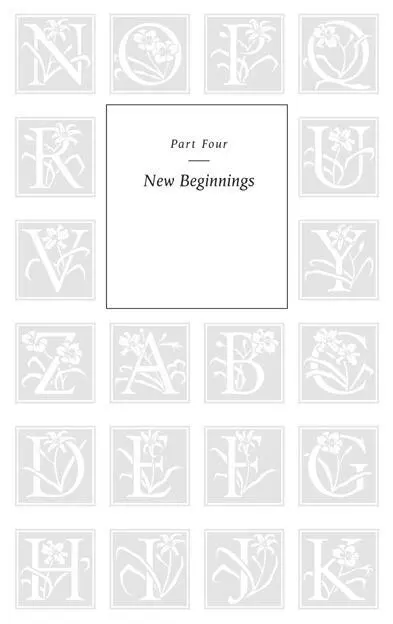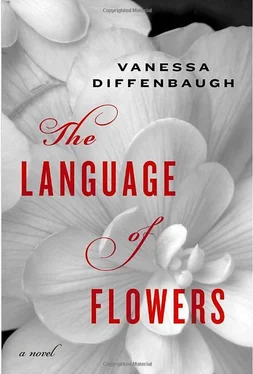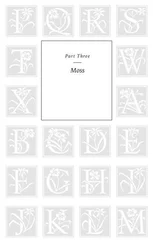There was no way to avoid it any longer. I had to face her. Walking downstairs, I unlocked the double glass doors and inched one open.
“What?” I demanded.
“I saw her,” Renata said. “This morning, at the market. I thought you had left with the baby, left without telling any of us where you were going, and then there she was in his arms.”
My eyes filled, and I lifted my shoulders by way of asking what she wanted from me.
“You told him?” Renata asked. “You gave him the baby?”
“I didn’t tell him anything,” I said. “And I don’t want you to tell me anything. Ever.” I swallowed hard.
Renata softened then. “She looked happy,” she said, “and Grant looked tired. But—”
“Please,” I said to Renata as I inched the door closed. “I don’t want to know. I can’t take it.”
I closed and locked the door. Renata and I stood on opposite sides of the glass in silence. The doors were not thick enough to block conversation, but neither of us spoke. Renata looked into my eyes, and I let her. I hoped she could see the longing, the loneliness, and the despair. It was hard enough to let my baby go. It would be harder with constant updates from Renata. She had to understand that the only way I could survive my decision was to try to forget.
Marlena drove up in my car, the hatchback open and flowers spilling out. Midway through unloading, she stopped, examining Renata and me.
“Everything okay?” she asked. Renata looked at me, and I turned my face away.
Renata didn’t answer. She turned up the hill to Bloom, her arms defeated at her sides.
Part Four
New Beginnings

Message grew exponentiallyin the months that followed. I accepted only cash, up front, and the underground quality attracted a cultlike following. I did not advertise. After the first few buckets of tagged iris, my phone number spread faster than it would have if I’d purchased a blinking billboard on the entrance to the Bay Bridge. Natalya did not return from her tour, and I took over the apartment, sending an envelope full of hundred-dollar bills to the landlord on the first of June. Marlena continued to work as my assistant, organizing the calendar, answering calls, filling purchase orders, and making deliveries. I supervised the flower arranging and met with clients on the folding flea-market chairs in the empty office space, the shoeboxes open under the harsh fluorescent lights.
My pre-wedding consultations were as in demand as my arrangements. Couples treated their appointments like visits to a fortune-teller or a priest; they told me, often for hours, the many hopes they held for their relationships, and also the challenges they faced. I recorded only a couple’s own words, taking notes on a sheet of transparent rice paper, and when they finished speaking, I handed them the paper, rolled into a scroll with a ribbon. Yet as the couples referenced the scroll to choose their flowers and craft their wedding vows, they credited me with forecasting their life together. Bethany and Ray were happily married. Countless other couples sent me cards from their honeymoons, describing their relationships with words like peace, passion, fulfillment , and an infinite number of flower-inspired qualities.
The rapid growth of Message—combined with an outpouring of florists offering consultations in the language of flowers to the streams of brides Marlena and I turned away—caused a subtle but concrete shift in the Bay Area flower industry. Marlena reported that peony, marigold, and lavender lingered in their plastic buckets at the flower market while tulips, lilac, and passionflower sold out before the sun rose. For the first time anyone could remember, jonquil became available long after its natural bloom season had ended. By the end of July, bold brides carried ceramic bowls of strawberries or fragrant clusters of fennel, and no one questioned their aesthetics but rather marveled at the simplicity of their desire.
If the trajectory continued, I realized, Message would alter the quantities of anger, grief, and mistrust growing in the earth on a massive scale. Farmers would uproot fields of foxglove to plant yarrow, the soft clusters of pink, yellow, and cream the cure to a broken heart. The prices of sage, ranunculus, and stock would steadily increase. Plum trees would be planted for the sole purpose of harvesting their delicate, clustered blossoms, and sunflowers would fall permanently out of fashion, disappearing from flower stands, craft stores, and country kitchens. Thistle would be cleared compulsively from empty lots and overgrown gardens.
Summer afternoons, as I worked in the rooftop greenhouse I’d constructed with PVC pipes and plastic sheeting, tending hundreds of small ceramic pots on wire racks, I tried to take solace in this small, intangible contribution to the world. I told myself that someone, somewhere, would be less angry, less grief-stricken, because of the rampant success of Message. Friendships would be stronger; marriages would last. But I didn’t believe it. I couldn’t take credit for an abstract contribution to the world when in every tangible human interaction I’d ever had I’d caused only pain: with Elizabeth, through arson and a false accusation; with Grant, through abandonment and an unnamed, unsupported child.
And then there was my daughter. That I had abandoned her did not leave my mind, not even for a moment. I could have moved in to Natalya’s old bedroom, but instead I still slept in the blue room, curled up alone in the space we’d once occupied together. Every morning upon waking, I counted her age to the month and day. Sitting across from chatty brides, I tried to remember her nearly hairless eyebrows, curved up at me in question, her lips opening and closing in rhythm. Her absence in the empty apartment began to feel as real as she’d once been, rattling the plastic sheeting of the greenhouse, seeping like light under the crack of the blue room’s door. In the tap of the rain on the flat roof, I heard her ravenous suck. Every twenty-nine days the moonlight traveled in a slow square across the futon where we sat on our last night together, and each month I half expected it to bring her back to me. Instead, the moonlight illuminated my solitude, and I sat upright in its pale glow, remembering her as she had been, imagining her as she had become. Miles and miles away, I felt my daughter changing, each day growing and developing, without me. I longed to be with her, to witness her transformation.
But as much as I wanted to be reunited, I would not go to her. My desire for my daughter felt selfish. Leaving her with Grant had been the most loving act I had ever accomplished, and I did not regret it. Without me, my daughter would be safe. Grant would love her like he had loved me, with unearned devotion and tender care. It was everything I wanted for her.
I had only one regret, and it had nothing to do with my daughter. In a life of trespasses, many violent and most undeserved, I regretted only the fire. A collection of jam jars, a fistful of matches, and an absence of judgment had created an inferno that blazed well past the extinguishing of the final flame. It burst forth into the lie that had taken me away from Elizabeth, ignited fights throughout eight years of institutional placements, and smoldered in my mistrust of Grant. I had refused to believe that he loved me, or that he would continue to love me if he knew the truth.
Grant believed his mother had lit the fire that ruined both our lives; though he didn’t talk about it, I knew he had not forgiven her. But she wasn’t the one to blame. It was my fault the vines went up in flames, my fault Elizabeth did not go to Catherine, my fault Grant spent the following year alone, caring for his sick mother. I didn’t know the details of Catherine’s unraveling, but they were clear in the way Grant loved me, delicately and in isolation. He had needed Elizabeth as much as I had.
Читать дальше













